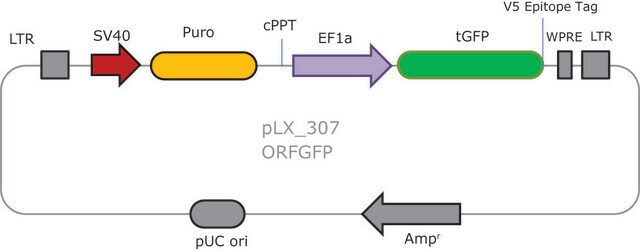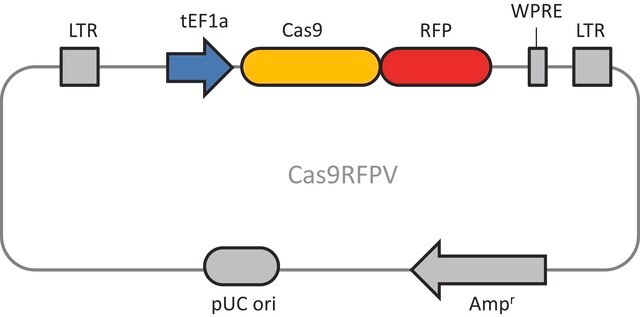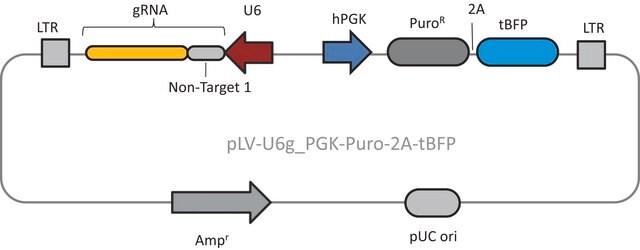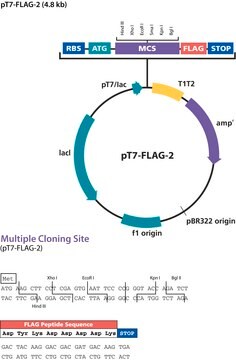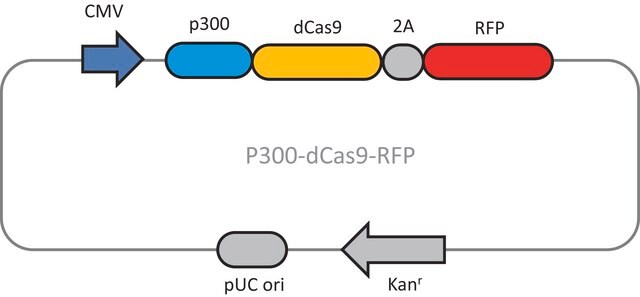CAS9RFPVP
Cas9-RFP Lenti Plasmid
Autenticatiper visualizzare i prezzi riservati alla tua organizzazione & contrattuali
About This Item
Codice UNSPSC:
41106609
NACRES:
NA.51
Prodotti consigliati
Ricombinante
expressed in E. coli
Forma fisica
liquid
Confezionamento
vial of 50 μL
Concentrazione
20 ng/μL in TE buffer; DNA (1μg of Plasmid DNA)
applicazioni
CRISPR
Gene reporter
RFP
selection
ampicillin
Condizioni di spedizione
dry ice
Temperatura di conservazione
−20°C
Descrizione generale
This product is a lentiviral plasmid that utilizes the EF1 alpha promoter to drive expression of Cas9 and RFP linked by a 2A peptide (EF1a-Cas9-2A-RFP) allowing for easy visualization of successful transfection or transduction. Use Sigma′s lentiviral Cas9 plasmid for generation of lentiviral particles and efficient production of stable cell lines expressing Cas9 for CRISPR based genome editing. Sigma′s Cas9-RFP lenti plasmid is one part of a two part CRISPR system with individual Cas9 and gRNA expression vectors. For easy fluorescence microscopy a MOI greater than 200 should be employed when packaged into lentiviral particles.
To order gRNA in any format click here
To order gRNA in any format click here
Applicazioni
Functional Genomics/Target Validation
- Creation of gene knockouts in multiple cell lines
- Complete knockout of genes not amenable to RNAi
- Manufacture of Cas9-RFP expressing Lentiviral Particles
Caratteristiche e vantaggi
- Highly specific
- Highly active
- Ready to use purified plasmid DNA
Principio
CRISPR/Cas systems are employed by bacteria and archaea as a defense against invading viruses and plasmids. Recently, the type II CRISPR/Cas system from the bacterium Streptococcus pyogenes has been engineered to function in eukaryotic systems using two molecular components: a single Cas9 protein and a non-coding guide RNA (gRNA). The Cas9 endonuclease can be programmed with a single gRNA, directing a DNA double-strand break (DSB) at a desired genomic location. Similar to DSBs induced by zinc finger nucleases (ZFNs), the cell then activates endogenous DNA repair processes, either non-homologous end joining (NHEJ) or homology-directed repair (HDR), to heal the targeted DSB.
Codice della classe di stoccaggio
12 - Non Combustible Liquids
Classe di pericolosità dell'acqua (WGK)
WGK 2
Punto d’infiammabilità (°F)
Not applicable
Punto d’infiammabilità (°C)
Not applicable
Certificati d'analisi (COA)
Cerca il Certificati d'analisi (COA) digitando il numero di lotto/batch corrispondente. I numeri di lotto o di batch sono stampati sull'etichetta dei prodotti dopo la parola ‘Lotto’ o ‘Batch’.
Possiedi già questo prodotto?
I documenti relativi ai prodotti acquistati recentemente sono disponibili nell’Archivio dei documenti.
Il team dei nostri ricercatori vanta grande esperienza in tutte le aree della ricerca quali Life Science, scienza dei materiali, sintesi chimica, cromatografia, discipline analitiche, ecc..
Contatta l'Assistenza Tecnica.
